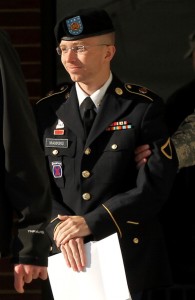Today I am going to observe the pre-trial hearings in US v. Manning that are taking place at Fort Meade, Maryland this week. Bradley Manning is a 25-year-old Private First Class in the United States Army who was arrested in May 2010 while stationed with the US army in Iraq. He has been in US military custody since his arrest. Manning was charged with 22 counts of misconduct – the most serious of which is “aiding the enemy”- connected to the release of various US Military videos, intelligence reports on the wars in Iraq and Afghanistan and State Department diplomatic cables on the website Wikileaks.
He is currently held in a medium security prison in Fort Leavenworth, Kansas and faces a military court martial trial at Fort Meade, Maryland. In early 2011, Amnesty International called on the US Government to end the unnecessarily harsh and punitive conditions under which Bradley Manning was held in pre-trial detention at the Quantico facility in Virginia.
We understand that his conditions improved considerably after he was transferred to a medium security military prison at Fort Leavenworth, Kansas, in late April 2011. Instead of being isolated, Bradley Manning is allowed to interact with other detainees, receive approved visitors, as well as receive mail from anyone while detained at Fort Leavenworth.








